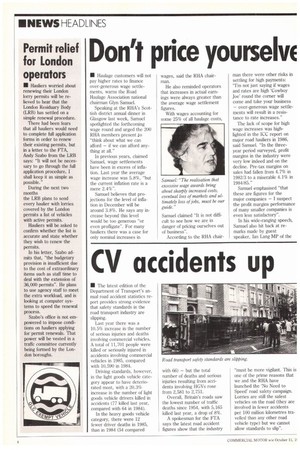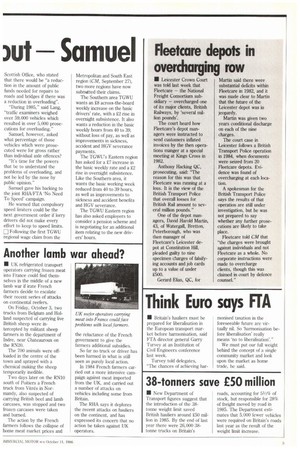Don't price yourselim Nut — Samuel
Page 6

Page 7

If you've noticed an error in this article please click here to report it so we can fix it.
• Haulage customers will not pay higher rates to finance over-generous wage settlements, warns the Road Haulage Association national chairman Glyn Samuel.
Speaking at the RHA's Scottish district annual dinner in Glasgow last week, Samuel spotlighted the forthcoming wage round and urged the 200 RHA members present ,to "think about what we can afford — if we can afford anything at all."
In previous years, claimed Samuel, wage settlements have been in excess of inflation. Last year the average wage increase was 5.8%, "but the current inflation rate is a mere 2.4%".
Samuel believes that projections for the level of inflation in December will be around 3.8%. He says any increase beyond this level would be too generous "or even profligate". For many hauliers there was a case for only nominal increases in wages, said the RHA chairman.
He also reminded operators that increases in actual earnings were always greater than the average wage settlement figures.
With wages accounting for some 25% of all haulage costs, Samuel claimed "It is not difficult to see how we are in danger of pricing ourselves out of business".
According to the RHA chair man there were other risks in settling for high payments: "I'm not just saying if wages and rates are high 'Cowboy Joe' round the corner will come and take your business — over-generous wage settlements will result in a resistance to rate increases."
The lack of scope for high wage increases was highlighted in the ICC report on major road hauliers in 1986, said Samuel. "In the threeyear period surveyed, profit margins in the industry were very low indeed and on the decline. Pre-tax margins on sales had fallen from 4.7% in 1982/3 to a miserable 4.1% in 1984/85."
Samuel emphasised "that these are figures for the major companies — I suspect the profit margins performance of many smaller companies is even less satisfactory".
In his wide-ranging speech, Samuel also hit back at remarks made by guest speaker, Ian Lang MP of the Scottish Office, who stated that there would be "a reduction in the amount of public funds needed for repairs to roads and bridges if there was a reduction in overloading".
"During 1985," said Lang, "traffic examiners weighed over 59,000 vehicles which resulted in over 5,000 prosecutions for overloading."
Samuel, however, asked what percentage of those vehicles which were prosecuted were for gross rather than individual axle offences?
"It's time for the powers that be to understand the problems of overloading, and not be led by the nose by public opinion."
Samuel gave his backing to the joint RHA/FTA 'No Need To Speed' campaign.
He warned that compulsory speed limiters could be the next government order if lorry drivers did not make every effort to keep to speed limits. 0 Following the first TGWU regional wage claim from the
Metropolitan and South East region (CM, September 27), two more regions have now submitted their claims.
The Southern area TGWU wants an E8 across-the-board weekly increase on the basic drivers' rate, with a £2 rise in overnight subsistence. It also wants a reduction in the basic weekly hours from 40 to 39, without loss of pay, as well as improvements in sickness, accident and HGV severance payments.
The TGWU's Eastern region has asked for a £7 increase in the basic weekly rate and a £2 rise in overnight subsistence. Like the Southern area, it wants the basic working week reduced from 40 to 39 hours, as well as improvements to sickness and accident benefits and HGV severance.
The TGWU Eastern region has also asked employers to consider a pension scheme and is negotiating for an additional item relating to the new drivers' hours.
























































































































